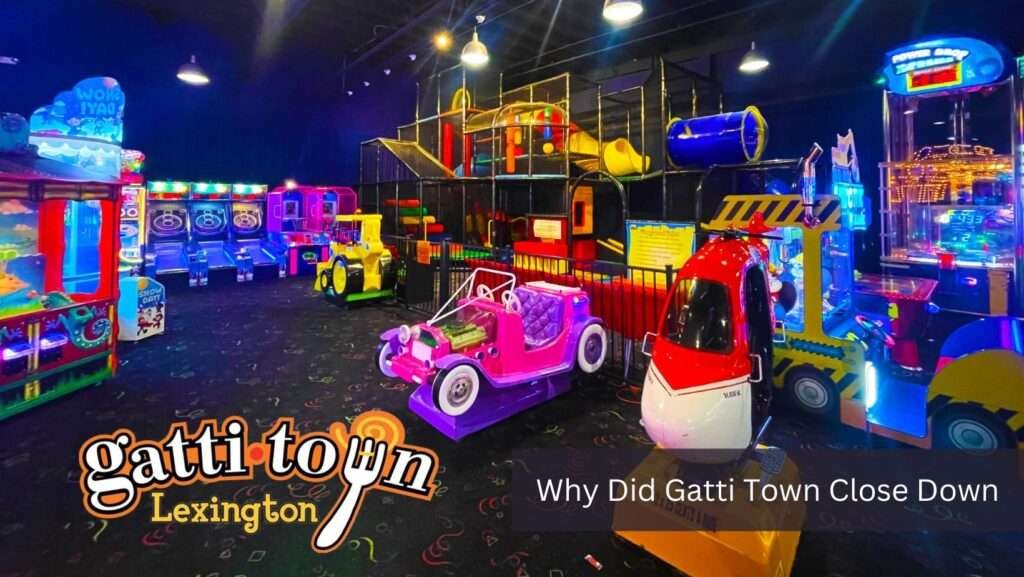Have you ever wondered Why Did Gatti Town Close Down? In the case of Gatti Town, the closure left many people puzzled and nostalgic. Let’s delve into the interesting story behind the shutdown of this once-thriving entertainment center.
Today, we’re going to talk about Why Did Gatti Town Close Down? For many people, it was a place where they had special memories. Through an in-depth analysis, we will discover why it suddenly disappeared from the area and how it affected customers and workers.
In this article, we will explain Why Did Gatti Town Close Down? by looking at eight important reasons that caused its downfall. Come with us as we look into what happened to Gatti Town, find out why it closed, and what it means for the entertainment business.
Rise of Gatti Town
Gatti Town became popular for families to have fun in the late 1900s. It had arcade games, cool restaurants, and a lively vibe. It began with just one place, but it got popular and grew quickly nationwide.
Gatti Town is where you can play games and eat food with your family. It’s a fun and affordable place to have parties and spend time together. Aside from making a lot of money, Gatti Town is remembered for its fun mascots, catchy songs, and yummy pizza. It’s a symbol of fun times that people remember fondly.
Even though Gatti Town has closed, people still remember the good times they had there with their families. It also had a big impact on other places that offer family fun. Today, Gatti Town still inspires other places to be fun and joyful like it, ensuring people will always remember the happy times they had there.
Eight Key Reasons For Closure
Gatti Town’s closure wasn’t surprising but the culmination of various factors that eroded its viability over time. Here, we break down eight critical reasons for its downfall:
1. Money Mismanagement
Financial mishandling plagued Gatti Town, leading to debt and operational challenges. Poor planning, excessive expansion, and misallocated funds drained resources and hindered profitability. Despite attempts to correct the course, the damage was done, leaving GattiTown unable to weather the financial storm.
2. Impact of COVID-19 Pandemic
The onset of the COVID-19 pandemic was a significant blow to GattiTown. Mandatory closures, capacity restrictions, and customer reluctance reduced foot traffic and revenue. Despite adapting to safety protocols and delivery services, the prolonged effects of the pandemic proved insurmountable, hastening Gatti Town’s decline.
3. Rise of Online Entertainment Choices
The proliferation of online entertainment platforms posed a significant challenge to Gatti Town’s traditional physical model. Streaming services, virtual entertainment, and mobile gaming offered convenient alternatives to in-person amusement, diminishing the appeal of physical venues like GattiTown.
4. Competition & Market Crowding
GattiTown faced intense competition from a crowded market of family entertainment centers. Competing establishments targeted the same demographic, saturating the market and diluting Gatti Town’s appeal. With numerous options available, consumers gravitated towards newer, trendier venues, leaving Gatti Town struggling to stay relevant.
5. Management and Leadership Issues
Internal strife and leadership failures hurt Gatti Town. Poor leadership, innovation, and organizational dysfunction hampered the company’s growth. Gatti Town could not sustain itself due to a lack of vision and leadership.
6. Quality & Customer Experience Decline
Gatti Town’s reputation suffered from poor customer service and quality. Consumers lost trust and loyalty due to long lines, filthy environments, and poor facilities. Despite occasional efforts to fix these shortcomings, Gatti Town struggled to reclaim its top family destination status.
7. Lease/Real Estate Issues
GattiTown closed due to lease negotiations and real estate dynamics. Rising rents, difficult lease conditions, and changing demographics increased financial constraints. As leases expired and renewal negotiations failed, GattiTown faced unsustainable overhead costs.
8. Rebranding/Revitalization
Rebranding and renovating GattiTown failed. Rebranding efforts typically lacked clarity and failed to resonate with consumers. Despite cosmetic renovations and marketing activities, Gatti Town struggled to recover.
Market Saturation & Competition
GattiTown faced a lot of competition in the family fun industry and too many businesses in the market. Gatti Town had difficulty competing against new rivals who had fun things to do, like arcades and amusement parks.
Price competition and big discounts made it harder to make money. Also, people started liking different things, and the industry became smaller, which made things even more difficult. Other businesses nearby were also a big danger. Even though they tried to be different, these things caused Gatti Town to fail and shut down.
Leadership Challenges And Management Decisions
Good management is very important, but Gatti Town had problems with making bad decisions and not being creative. This led to less money coming in and not being as important anymore. Inside the company, problems with how it ran and changes in leadership made it hard to get things done.
Also, focusing on making money immediately meant customers didn’t trust the company, so Gatti Town had to shut down because it couldn’t do well. Gatti Town’s management had a hard time because they didn’t have a clear plan, and many different leaders came and went.
This made it difficult to keep the same direction and plans for the future. The instability made GattiTown less strong in the market, and this caused it to close in a competitive place.
Quality & Customer Experience Issues
Good management is really important, but Gatti Town had problems making bad decisions and not coming up with new ideas. This caused their income to drop and made them less important.
Inside the company, problems with how it was run and leadership changes made it hard to get work done.
Also, the company focused too much on making money quickly and didn’t focus on keeping the trust of its customers. Because of these issues, Gatti Town had to close down. Gatti Town had trouble being stable because the people in charge kept changing, and there wasn’t a clear plan.
This made it hard to have consistent plans. The company’s unstable situation made it lose its place in the market, leading to Gattitown closing down in a competitive market.
Lease & Real Estate Considerations
The story of why Gatti Town shut down has much to do with how complicated land and rent agreements can be. This part of their journey looks at the different rent and real estate issues that significantly impact the closing of popular entertainment spots. They had problems running their business and getting by in a world where bad terms and rising costs made it harder and harder to stay alive.
A big problem for Gatti Town was that rents went up too much. Costs to rent prime locations went through the roof as cities grew and more businesses needed room. This put a lot of financial stress on Gatti Town because their profits started dropping due to the high costs.
In addition to these growing costs, Gatti Town also had to deal with lease agreements that could have been better. Many of their long-term leases had strict rules about renewing them and big rent hikes, which made it very hard for them to be financially stable and flexible.
Also, the areas around Gatti Town stores changed over time, which caused changes in the types of people who walked by and bought things. These changes, not knowing if the lease would be renewed, and the chance of more rent increases made things even harder on the budget.
The real estate market was constantly changing, and Gatti Town grew slower than it would have liked because the land was expensive and hard to find. Legal and governmental problems and economic downturns made things even harder for them, which is one reason they decided to shut down.
Conclusion: Why Did Gatti Town Close Down?
GattiTown closed down because it faced a lot of problems at the same time. The company had trouble managing its money, and the COVID-19 pandemic worsened things. People were also choosing to watch entertainment online instead of using the company’s services, and there was a lot of competition in the market.
Disagreements inside the company, customers not being happy, and the cost of buildings going up made it harder to make the brand popular again. Gatti Town tried to change its image and how it worked, but it still failed. This shows how important it is for leaders to be able to change and lead in the ever-changing world of family entertainment.
FAQs- Why Did Gatti Town Close Down?
What Caused Gatti Town’s Closure?
Financial failure, the COVID-19 pandemic, the rise of online gaming, wild contests, and internal operational issues caused GattiTown to close.
Was GattiTown Closed Due To Management Issues?
Executive decisions and power concerns contributed to Gatti Town’s death. Unfortunately, direction, lack of development, hierarchical brokenness, and temporary center hindered the organization’s ability to adapt and thrive in a competitive market.
What Impact Did Customer Service And Quality Have On GattiTown?
Delays, poor conveniences, inconsistent food quality, and poor customer service eroded customer trust and satisfaction, hurting Gatti Town’s reputation and productivity.
How Did Leases And Real Estate Affect Gatti Town’s Closure?
Gatti Town’s conclusion was exacerbated by rent and land issues such as rising rents, foreboding rent terms, shifting neighborhood characteristics, and limited development opportunities.
What Can Gatti Town’s Closure Teach Us?
Gatti Town concludes that flexibility, advancement, crucial foreknowledge, and compelling authority are essential in navigating family media outlet challenges. Companies must prioritize customer experience, quality, and long-term support to succeed in a competitive market.
You may also read!
Why Is Crumbl Closed On Sunday?
Is Lucid Going Out Of Business
Is AmeriGas Going Out Of Business?







